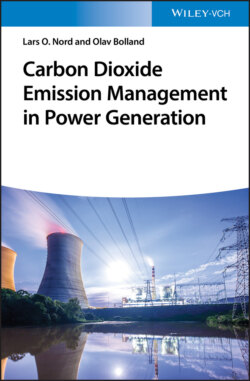Читать книгу Carbon Dioxide Emission Management in Power Generation - Prof. Lars O. Nord - Страница 2
Table of Contents
Оглавление1 Cover
2 Preface
3 Acknowledgements
4 Nomenclature Latin Symbols Greek Symbols Abbreviations
5 Organisation and Use of Book
6 1 Introduction 1.1 Greenhouse Effect 1.2 Atmospheric CO2 1.3 Natural Accumulations and Emissions of CO2 1.4 Man-made Emissions of CO2 1.5 Climate Change 1.6 Fossil Fuel Resources 1.7 Definition and Rationale of CO2 Capture and Storage (CCS) 1.8 Magnitude of CCS 1.9 Public Acceptance of CCS 1.10 Show-stoppers for CCS Deployment? 1.11 History of CCS Notes
7 2 Long-Term Storage of CO2 2.1 Storage Time and Volume 2.2 Underground Storage 2.3 Ocean Storage 2.4 Mineral Carbonation 2.5 Industrial Use – Products 2.6 Requirements for CO2 Purity and Transportation 2.7 CO2 Compression and Conditioning 2.8 Transportation Hazards of CO2 2.9 Monitoring of CO2 Storage Note
8 3 Fuels 3.1 Coal 3.2 Liquid Fuels 3.3 Gaseous Fuels 3.4 Fuel Usage Note
9 4 CO2 Generation, Usage, and Properties 4.1 Short on CO2 4.2 CO2 Chemistry and Energy Conversion 4.3 Combustion 4.4 Analogy Between CO2 Capture and Desulfurisation 4.5 Industrial Processes 4.6 How Do We Use CO2? 4.7 CO2 and Humans 4.8 Properties of CO2 Notes
10 5 Power Plant Technologies 5.1 Coal-Fired Power Plants 5.2 Gas Turbine Power Plants 5.3 Combined Cycles 5.4 Heat Recovery Steam Generators 5.5 Steam Cycle Cooling Systems 5.6 Internal Combustion Engines 5.7 Flue Gas Cleaning Technologies in Power Plants Notes
11 6 Theory of Gas Separation 6.1 Gas Separation in CO2 Capture 6.2 Theory of Compression and Expansion 6.3 Theory of Separation 6.4 Minimum Work Requirement for Separation – Examples Notes
12 7 Power Plant Efficiency Calculations 7.1 General Definition of Efficiency 7.2 Definition of the Term ‘Efficiency’ 7.3 Fuel Energy 7.4 Efficiency Calculations 7.5 Heat Rate Versus Efficiency 7.6 Additional Consumption of Fuel for CO2 Capture 7.7 Relating Work Requirement for CO2 Capture and Efficiency 7.8 Terms Related to CO2 Accounting Notes
13 8 Classification of CO2 Capture Methods 8.1 Following the CO2 Path 8.2 Principles for Combining Power Plants and CO2 Capture 8.3 Dilution of CO2
14 9 CO2 Capture by Gas Absorption 9.1 Theory of Absorption 9.2 Absorption Process 9.3 Solvents for Absorption 9.4 Solvent Contaminants 9.5 Solvent Loading 9.6 Energy Use in Absorption Processes Notes
15 10 CO2 Capture by Other Gas Separation Methods 10.1 Membranes 10.2 Adsorption 10.3 Calcium Looping 10.4 Anti-sublimation 10.5 Distillation 10.6 CO2 Hydrate Formation 10.7 Electrochemical Separation Processes Notes
16 11 Removing Carbon from the Fuel – Pre-combustion CO2 Capture 11.1 Principle 11.2 Hydrogenator and Desulfuriser 11.3 Pre-reforming 11.4 Reformers 11.5 Gasification Theory and Principles 11.6 Gasifiers 11.7 Syngas Quenching 11.8 Syngas Coolers 11.9 COS Hydrolysis 11.10 Water—Gas Shift (WGS) 11.11 Integrated Pre-combustion Approaches Note
17 12 Pre-combustion CO2 Capture in Power Cycles 12.1 Classification 12.2 IGCC with CO2 Capture 12.3 IRCC – Integrated Reforming Combined Cycle Note
18 13 Post-combustion CO2 Capture in Power Cycles 13.1 Classification 13.2 Power Plant with Absorption of CO2 from the Flue Gas 13.3 Post-combustion Efficiency Penalty – Absorption 13.4 Steam Turbine Steam Extraction 13.5 Flue Gas Pressure Drop 13.6 Post-combustion CO2 Capture at Atmospheric Pressure with Flue Gas Recirculation (FGR) 13.7 Post-combustion CO2 Capture at Elevated Pressure
19 14 Oxy-combustion CO2 Capture in Power Cycles 14.1 Classification 14.2 Air Separation for Production of Oxygen 14.3 Oxy-combustion with Coal 14.4 Oxy-combustion with Natural Gas
20 References
21 Glossary Terms Terms Used for Coal
22 Index
23 End User License Agreement
